News
Corinne Deloy,
Fondation Robert Schuman,
Helen Levy
-

Available versions :
EN

Corinne Deloy
Fondation Robert Schuman
Helen Levy
On 4th May last the National Electoral Commission announced that the 48% share of Muslims, 37% Serbs and 14.3% Croats (2000 figures) which make up the population would be called to ballot on 1st October next to elect the three members of the Collegial Presidency and the 42 representatives of the Chamber of Representatives, the lower Chamber of the Central Parliament of Bosnia-Herzegovina.
The inhabitants of the Federation of Bosnia-Herzegovina will also be re-electing the 98 members of their Chamber of Representatives and those in the ten local assemblies; the inhabitants of the Serb Republic will elect the 83 members of the National Assembly as well as the President and the Vice Presidents.
48 political parties and more than 9,000 candidates, including 12 independents, will be running in the elections on 1st October. Around one hundred NGO's adopted a citizens' platform defining twelve priorities for the political parties which include unemployment, poverty, retirement pensions, social security and youth issues. The platform has also highlighted the need for investments in the public sector, the fight against corruption and the acceleration of the process to integrate Europe.
The Political System
The Republic of Bosnia-Herzegovina is a confederation comprising two entities: the Federation of Bosnia-Herzegovina and the Serb Republic (Srpska). The country has a Collegial Presidency elected for four years comprising three members – a Croat, a Serb and a Muslim – elected by universal suffrage by the community. The management of the Presidency alternates every eight months between the various communities:
Sulejman Tihic (Democratic Action Party SDA) has occupied the position since 28th February 2006,
Borislav Paravac (The Serb Democratic Party, SDS) replaced Mirko Sarovic dismissed in 2003 by the UN High Representative in Bosnia-Herzegovina, Paddy Ashdown for having encouraged the sales of arms to Iraq,
Ivo Miro Jovic (Croat Democratic Community of Bosnia-Herzegovina) took over from Dragan Covic on 9th May 2005 since the latter was also dismissed by Paddy Ashdown.
The President of the Council of Ministers is appointed by the Presidency. It appoints the ministers and deputy ministers since they must not belong to the same ethnic group as the ministers they report to.
The Central Parliament of the Republic of Bosnia-Herzegovina is bicameral and comprises the Chamber of Representatives and the People's Chamber. This comprises 15 members (5 Muslims, 5 Serbs and 5 Croats) appointed by the Lower Chambers of both entities which make up the country: the Chamber of Representatives of the Federation of Bosnia-Herzegovina and the National Assembly of the Serb Republic. The Chamber of Representatives comprises 42 representatives elected by the whole population for a period of two years; 28 representatives of the Federation of Bosnia-Herzegovina and 14 from the Serb Republic. But the central institutions have little power in Bosnia-Herzegovina since each of the entities has their own political institutions as well as their own army, police force and legal system etc ...
The Federation of Bosnia-Herzegovina (51% of the territory and 70% of the population, whose capital is Sarajevo), has a President of the Republic (Croat) -Niko Lozancic- and two Vice-Presidents (one Muslim and the other Croat): Sahbaz Dzihanovic and Desnica Radivojevic. These are elected by Parliament. This comprises two chambers: the Chamber of Representatives which has 98 representatives elected by proportional vote and the People's Chamber which has 60 representatives (30 Muslims and 30 Croats) appointed by the ten local assemblies in the Federation.
The Serb Republic (49% of the territory and 25% of the population whose capital is Banja Luka) is led by a President, Dragan Cavic, leader of the Serb Democratic Party (SPS), elected by direct universal suffrage. Parliament is mono-cameral; the National Assembly comprises 83 representatives elected by proportional vote.
The main political parties in the Republic of Bosnia-Herzegovina are:
- the Democrtic Action Party (SDA), a party led by the President in office of the Collegial Presidency of Bosnia-Herzegovina, Sulejman Tihic, holding the majority in the Chamber of Representatives of the Federation of Bosnia-Herzegovina;
- the Social Democrat Party (SDP) led by Zlatko Lagumdzija ;
- the Croatian Democratic Community of Bosnia-Herzegovina (HDZ-BH) led by Collegial Presidency member Dragan Covic, the winner of the last presidential election of the Croatian college;
- the Party for Bosnia-Herzegovina (SB-H) founded by the former Prime Minister and Foreign Minister Haris Silajdzic. The latter, who was leader of the party until September 2001, was re-elected to this position on 20th May last to maintain the integrity of Bosnia-Herzegovina and the fight against the concept of the country's division;
- the Serb Democratic Party (SDS), a party led by the President of the Serb Republic, Dragan Cavic which holds the majority in the Serb National Assembly;
- the Independent Social Democrat Party (SNSD) led by Milorad Dodik ;
- the Democratic Progress Party (PDP) led by Mladen Ivanic.
The political and economic situation
The last presidential and general elections on 5th October 2002 for which only half of the voters turned out to vote (54.98%), witnessed the victory of the ruling nationalist parties, in power since the end of the war (1995). The Democratic Action Party (SDA), the Serb Democratic Party (SDS) and the Croat Democratic Community (HDZ-BH) easily won the election. The three seats of the Collegial Presidency went to three nationalist politicians: Sulejman Tihic, leader of the Democratic Action Party, Mirko Sarovic (SDS) and Dragan Covic, (HDZ-BH). Dragan Cavic (SDS) was elected President of the Serb Republic. Two years on the nationalists won the local elections on 2nd October 2004 after an electoral campaign that focussed on ethnic themes.
The Dayton Agreements (21st November 1995) signed in Paris on 14th December 1995 put an end to the war between the Serbs, Croats and Bosnians, that had caused over 200,000 deaths and these stipulate that the international community will help with the political and economic development of Bosnia-Herzegovina in a pacified environment which respects the United Nations' fundamental principles (democracy and respect of Human Rights). Eleven years after the end of the war the country, where vital reforms are impeded on a regular basis, and sometimes even prevented by nationalist forces, is still greatly dependent on international aid. The international community is also the guarantor of the country's stability: 6,300 men belonging to EUFOR, the EU's military force, have ensured the country's security since December 2004. This mission, baptised Althea, comprises men from around 30 European countries including 22 EU Member States. The UN international police force in Bosnia-Herzegovina was replaced at the end of the 2002 by the EU Police Mission.
Bosnia-Herzegovina is a Confederation which comes under the administration of the High Representative of the International Community and envoy of the European Union, Christian Schwarz-Schilling, appointed on 14th December 2005 in replacement of Paddy Ashdown. The High Representative enjoys a great amount of power: he can force laws on the Bosnian institutions or dismiss any individual whose activities are contrary to democratic principles.
National reconstruction has been slow and is struggling due to the lack of any common vision on the part of the three groups that make up the population. Most Muslims would like a united Bosnia, whilst the nationalist Serbs and Croats dream of unification with their "mother" country. The institution of "trans-entity" services (customs, banks, railways) is finding it difficult to become established. Progress has however been made and the country has moved over the last few years from the status of being a post-war economy to one that is in transition. GDP growth reached 5.3% in 2005, inflation is low and exports have risen considerably over the last few months (+ 33.5% between the first four months of 2006 and those of 2005). However although violence has decreased greatly peace is still incomplete and the country's democratisation as its reconstruction depends very much on action taken by the international community. One quarter of Bosnians (25%) live below the poverty line and unemployment affects more than 35% of the working population. Although most small companies have been privatised the major monopolies (telecommunications, energy etc ...) remain within the hands of the State. The International Monetary Fund (IMF) called Bosnia-Herzegovina to order mid-July asking the government to resist the temptation of any pre-electoral spending. But there is still much to be done to re-establish the country that was severely hit by a war which the Dayton Agreements put an end to but which did not lead to the laying of true foundations of a State or achieving national reconciliation.
The Election Stakes
At the end of April the Chamber of Representatives of the Republic of Bosnia-Herzegovina caused the failure of the project to modify the Constitution. Only two more votes were required during voting: 26 representatives voted in favour of the text 16 against. The amendments put forward were the result of an agreement between the Democratic Action Party, the Croat Democratic Community, the Social Democrat Party, the Independent Social Democrat Party and the Democratic Progress Party. In order to strengthen the Bosnian executive they planned, amongst other things, to put an end to the Collegial Presidency and replace this by a President assisted by two Vice-Presidents – the Prime Minister and the President of Parliament – who would have occupied the position alternately. The rejection of the amendments was a victory for the Party for Bosnia-Herzegovina the leader of which, Haris Silajdzic, had criticised the constitutional modification planned under the pretext that it did not really modify the structure of Bosnia-Herzegovina. He campaigned against the reform of the Fundamental Law promoting a Bosnia without entities ("Bez entita" was still his party's motto just a few years ago). Many observers accused him of having defended the rejection of the amendments for electoral reasons. The former Home Minister of the Federation of Bosnia-Herzegovina, Mehmed Zilic went against his party's voting advice and also voted against the modification of the Constitution. He justified his vote by explaining that it was vital, before modifying the Fundamental Law to abolish the symbols of the Serb Republic and to wait for the outcome of the trial launched by the International Court of Justice. The Serb Radical Party - Vojislav Seselj (SRS-VS), the Croat Democratic Community and two independent representatives also voted against the amendments.
According to an opinion poll by IRI most Bosnians were in favour of a modification of the Constitution: 53.5% versus 26% and 19.4% with no opinion. The highest number of votes in favour of the modification of the Fundamental Law came from the inhabitants of the Federation of Bosnia-Herzegovina (57.5% versus 48.5% amongst the inhabitants of the Serb Republic). The Muslim community were more in favour (60.6% versus 50.3% amongst Croats and 44.9% amongst the Serbs).
On many occasions the EU has pointed out to the Bosnian authorities that the upkeep of the present system would deprive the country all access to the EU. "Bosnia-Herzegovina is in danger of missing out on its opportunity to draw closer to the EU because of the slow pace of the reforms," declared Reinhard Priebe, director of Enlargement for the European Commission. The opening of negotiations with Bosnia-Herzegovina was approved after the country's two entities – the Federation of Bosnia and the Serb Republic – agreed on the creation of a single, multiethnic police force. But since then the leaders of the Serb Republic have stopped working on the project that aimed to establish this police force saying that they wanted to maintain their own Home Office. Other economic reforms or those involving education or the media are still incomplete. Negotiations on the modification of the Constitution are to continue after the elections on 1st October.
The Council of Europe condemned the refusal by Serb representatives to take part in the work on the reform of the police force and pointed out that the organisation of a census by 2010 at the latest and the establishment of a commission for truth and reconciliation were to feature as priorities on the agenda of any future government.
High Representative Christian Schwarz-Schilling also criticised the members of the National Parliament and more specifically the Croat and Muslim representatives for their show of bad faith and lack of will to bring the reforms to a successful conclusion. On 24th May he spoke to the Bosnian parliamentarians asking them to take advantage of the hundred days remaining before the election to show voters and the international community their desire to improve living standards of their co-citizens and to move forwards on the road to the country's integration into Euro-Atlantic structures. He recalled that the non-application of the reform of the police and the public audio-visual services would herald the end of the EU accession procedure; he enumerated all of the laws that had to be voted on; primarily these include those involving education and notably higher education. Mr Schwarz-Schilling accused the authorities of the Serb Republic of persistent obstruction to the police reform.
On 29th June the Council of Europe exhorted Bosnia-Herzegovina via a resolution voted in by 53 votes in favour versus 28 against, to amend its Constitution by October 2010 at the latest: "Although it is highly unrealistic to believe that Bosnia-Herzegovina will give up its system of representation based on ethnic origins in order to adopt a more citizen oriented system the adoption of a new Constitution would certainly be preferable to any improvement on the one that resulted from the Dayton Agreements." This resolution also takes a stance against the holding of a referendum on the possible secession on the part of the Serb Republic. The Council of Europe's press release stipulates that a popular consultation such as this has no constitutional founding and the collation of 50,000 signatures on a petition requesting the organisation of a referendum would not be a legal basis for holding one.
The referendum on independence in Montenegro which took place on 21st May did not fail in giving ideas to some Serbs in Bosnia-Herzegovina. "The international community will not allow the sovereignty and territorial integrity of Bosnia-Herzegovina to be put into peril. The Serb Republic has no power to organise a referendum on its independence and any action like this would break the Dayton Peace Agreements," warned Mr Schwarz-Schilling. For their part the Serbs are increasing the contradictory declarations they make about this. On 31st May the Prime Minister of the Serb Republic, Milorad Dodik (SNSD) stressed: "the referendum represents a democratic tool and theoretically we shall be able to use this in the future if we are unable to build a Bosnia that belongs to everybody. If Sarajevo constantly sends us the same message claiming that the Serb Republic should not exist because it would be an entity born of genocide we shall give them an answer called "the people" and "referendum"." A few days later he maintained: "I am not an adventurer who thinks that a referendum should be organised because there is no basis for such a thing and no possibility of acknowledgement on the part of the international community."
The EU's High Representative for the Common Foreign and Security Policy (CFSP), Javier Solana, and US Deputy Assistant Secretary of State, Rosemary Di Carlo, rejected the idea of such a referendum. However the President of the Democratic Party of Serbia, the party of the Serb Prime Minister, Vojislav Kostunica, travelled to Banja Luka to support the positions adopted by the leaders of the Serb Republic and said that if ever the independence of Kosovo were announced this would open the way to the separation of the two entities comprising the Republic of Bosnia-Herzegovina. A recent poll by Partner revealed that 75% of Bosnians would vote in favour of the separation of the Serb Republic and the Federation of Bosnia-Herzegovina if a referendum on the subject were to take place.
The Council of Europe recently reminded the Bosnian authorities of the need for them to co-operate with the International Criminal Tribunal for former Yugoslavia in the Hague (ICTY) with regard to the arrest of two former Bosnian-Serb political and military leaders – the General in charge of the Serb military forces in Bosnia, Ratko Mladic and the "President" of the Serbs of Bosnia, Radovan Karadzic – both on the run since 1995 and their indictment for genocide, crimes against humanity (notably during the siege of Sarajevo that caused the death of 10,000 and the massacre of Srebrenica where 8,000 Muslims died in July 1995) and war crimes in their role in the war between 1992-95.
On 25th March the President of the Council of Ministers Adnan Terzic surprised everyone by declaring that a commission responsible for enquiring into the disappearance of Muslims and Serbs in ten municipalities of Sarajevo for the period of 1992-95 would be created shortly. This commission will comprise three representatives of each of the three ethnic groups as well as a representative of the "others" and is due to deliver its report in a year's time. Although he was against the creation of a commission such as this Adnan Terzic finally changed his mind so that those who wanted to prevent Parliament's work and the obligatory reforms would not have any pretext. The President in office Sulejman Tihic, qualified the establishment of a commission for Sarajevo as "hypocritical" if there was to be none for Zvornik, Brcko and the other towns; he said that he wanted the establishment of one commission for the whole of Bosnia-Herzegovina. "The victims cannot be divided according to criteria of nationality, religion or territory," he declared accusing the authorities of the Serb Republic of excessively politicising the issue.
In the past the authorities of the Serb Republic have often compared the crimes committed on the Muslims in Srebrenica with those committed against the Serbs in Sarajevo. According to their statistics between 3,000 and 5,000 Serbs died in Sarajevo. The Croat and Muslim authorities of the Federation of Bosnia-Herzegovina believe this figure is somewhat exaggerated. The Helsinki Committee for Human Rights in Bosnia-Herzegovina for its part suggests a figure of between 500 and 600 people. Three years ago the Chamber of Representatives of the Republic of Bosnia-Herzegovina ordered the authorities of the Serb Republic to inquire into the circumstances surrounding the fall of Srebrenica. After the intervention of the High Representative the Serb entity published a report which for the first time ever officially acknowledged the crimes committed in Srebrenica. President Dragan Cavic also apologised to the families of the victims.
The investigative committee on Sarajevo might lead to the creation of other committees designed to inquire into other crimes that took place in other towns across the country.
The Electoral Campaign
At the Collegial Presidency the President in office, Sulejman Tihic, and Croat Ivo Miro Jovic (HDZ-BH) are standing for re-election.
Croat Zeljko Komsic (SDP), and Muslims Haris Silajdzic, Mirnes Ajanovic (Bosnian Party, BOSS) and Serbs Mladen Bosic (SDS) and Nebojsa Radmanovic (SNSD) are also candidates.
Haris Silajdzic, Zeljko Komsic and Nebojsa Radmanovic are also forecast to be winners by the latest opinion polls.
The Democratic Action Party (SDA) is in the lead in the polls in terms of voting intentions but the gap between it and its main adversary, the Social Democrat Party (SDP) will gradually diminish over the next few weeks. The SDA leads in Zenica-Doboj and Bihac, whilst the SDP is running ahead in Sarajevo and Tuzla. The Party for Bosnia-Herzegovina (SBH) lies third except in Zenica-Doboj where the Bosnian Patriotic Party is ahead of it.
The main Croat party the Croat Democratic Community (HDZ-BH) is losing ground. Its leader, Dragan Covic gave up standing in the next elections and his spokesperson Miso Relota warned the authorities of seeing the country's Croats becoming a national minority. "After the elections, the majority political parties will modify the Constitution. Without a Croat representative this will be fatal for the community and we shall fight against these modifications," he declared. "The Party for Bosnia-Herzegovina recently adopted a resolution that mentions discrimination, amongst other things against Croats, but the new Constitution of Bosnia-Herzegovina must be the result of a consensus and be acceptable to all three communities," added Miso Relota. The leaders of the four Croat parties – the Croat Democratic Community-1990 led by Bozo Ljubic, the Croat Farmers' Party (HSS) led by Marko Tadic, the Croat Christian Union (HKDU) led by Marin Topic and the Croat Democratic Union (HDU) – signed an agreement in view of the upcoming elections. The coalition will be led by Bozo Ljubic, the founder of the Croat Democratic Union after he left the Croat Democratic Community when he disagreed with its leader Dragan Covic. Recently he declared that he wanted to offer a true alternative to the Croats of Bosnia-Herzegovina and that he would make no alliance with the HDZ, since the party had said that it was in favour of the constitutional amendments during voting at the end of April in Parliament. According to Bozo Ljubic, these amendments would be damaging to the Croatian population.
The failure of the vote on the constitutional amendments led to a more radical political environment. Two blocs are facing each other within the Federation of Bosnia-Herzegovina: the Democratic Action Party and the Social Democrat Party; the Party for Bosnia-Herzegovina, the Social Democrat Union and the Bosnian Party. In the Serb Republic the Independent Social Democrat Party, the Socialist Party and the National Democratic Union are facing the Serb Democratic Party and other "small" radical parties.
The present President of the Serb Republic and President of the Serb Democrat Party, Dragan Cavic is standing for re-election as head of the Serb entity.
Political analysts forecast a difficult electoral campaign. They are anticipating that the parties will rely on voters' ethnic identity pushing them to vote on mainly ethnic issues. Socio-economic problems will once again be relegated to secondary status. "Today we are in the middle of a dangerous campaign. All of the parties are using the national institutions to their benefit," stresses political analyst Tanja Topic who added, "once again people are not going to vote on programmes but on names although these names have been the same for years and years." A recent survey showed that 80% of the candidates in the upcoming elections have been in power for several years.
The electoral campaign officially started on 1st September.
Reminder of the Election Results of 5th October 2002
Participation rate: 54.98%
Presidential election of the Republic of Bosnia Herzegovina
Muslim College
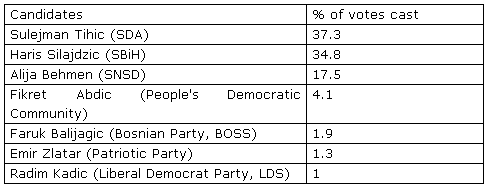
Serb College
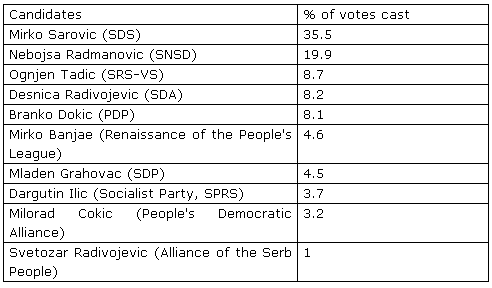
Croat College
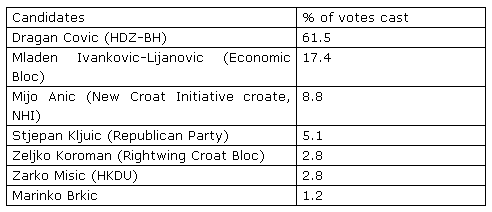
General Elections
Chamber of Representatives of the Republic of Bosnia-Herzegovina
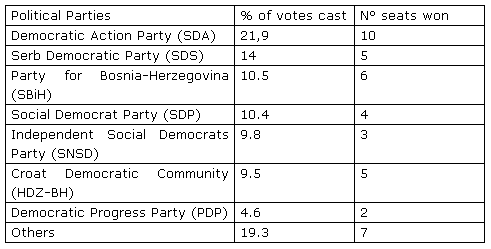
Chamber of Representatives of the Federation of Bosnia-Herzegovina

National Assembly of the Serb Republic
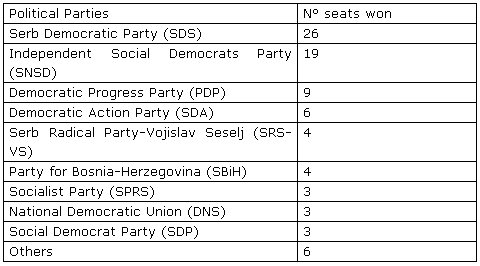
On the same theme
To go further
Elections in Europe
Corinne Deloy
—
15 April 2025
Elections in Europe
Corinne Deloy
—
25 February 2025
Elections in Europe
Corinne Deloy
—
18 February 2025
Elections in Europe
Corinne Deloy
—
28 January 2025

The Letter
Schuman
European news of the week
Unique in its genre, with its 200,000 subscribers and its editions in 6 languages (French, English, German, Spanish, Polish and Ukrainian), it has brought to you, for 15 years, a summary of European news, more needed now than ever
Versions :



